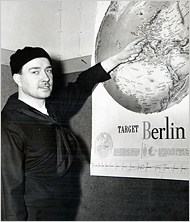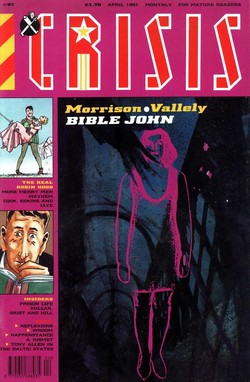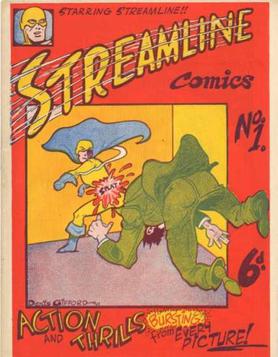
2000 AD is a weekly British science fiction-oriented comic magazine. As a comics anthology it serialises stories in each issue and was first published by IPC Magazines in 1977, the first issue dated 26 February. Since 2000 it has been published by Rebellion Developments.

Grant Morrison MBE is a Scottish comic book writer, screenwriter, and producer. Their work is known for its nonlinear narratives, humanist philosophy and countercultural leanings. Morrison has written extensively for the American comic book publisher DC Comics, penning lengthy runs on Animal Man, Doom Patrol, JLA, Action Comics, and Green Lantern as well as the graphic novels Arkham Asylum, JLA: Earth 2, and Wonder Woman: Earth One, the meta-series Seven Soldiers and The Multiversity, the mini-series DC One Million and Final Crisis, both of which served as centrepieces for the eponymous company-wide crossover storylines, and the maxi-series All-Star Superman. Morrison's best known DC work is the seven-year Batman storyline which started in the Batman ongoing series and continued through Final Crisis, Batman and Robin, Batman: The Return of Bruce Wayne and two volumes of Batman Incorporated. They also co-created the DC character Damian Wayne.
Paul Grist is a British comic book creator, noted for his hard-boiled police series Kane and his unorthodox superhero series Jack Staff.

Crisis was a British comic anthology published by Fleetway Publications from 17 September 1988 to October 1991, initially fortnightly and later monthly. Designed to appeal to older readers than other Fleetway titles in order to take advantage of a boom in interest in 'adult' comics, Crisis featured overtly political and complex stories; one issue was even produced in conjunction with Amnesty International.

William Patrick Stuart-Houston was a British-American entrepreneur and the half-nephew of Adolf Hitler. Born and raised in the Toxteth area of Liverpool to Adolf's half-brother Alois Hitler Jr. and his Irish wife Bridget Dowling, he later relocated to Germany to work for his half-uncle before returning back to London and later emigrating to the United States, where he received American citizenship and ended up serving in the United States Navy against his half-uncle and Nazi Germany during World War II, changing his surname after the war.

Bridget Elizabeth Hitler, née Dowling, was Adolf Hitler's half sister-in-law via her marriage to Alois Hitler Jr. She was the mother of Alois Hitler's son William Patrick Hitler. She was born and raised in Dublin, Ireland.
Gideon Stargrave is a comics character created by Grant Morrison in 1978 for the anthology comic Near Myths, and later incorporated into their series The Invisibles. The character is based on J. G. Ballard's "The Day of Forever" and Michael Moorcock's Jerry Cornelius, which led to accusations of plagiarism from Moorcock.
Steve Yeowell is a British comics artist, well known for his work on the long-running science fiction and fantasy weekly comic 2000 AD.

Revolver was a British monthly comic anthology published by Fleetway Publications from July 1990 to January 1991. The comic was designed as a monthly companion title to Crisis and was intended to appeal to older readers than other Fleetway titles in order to take advantage of a boom in interest in 'adult' comics. Revolver was not a commercial success, and lasted just seven issues before being cancelled and merged with Crisis.
Brendan McCarthy is a British artist and designer who has worked for comic books, film and television. He co-wrote the film Mad Max: Fury Road. He is the brother of Jim McCarthy.

Robot Archie is a British comic character, appearing in strips published by Amalgamated Press, Fleetway Publications and IPC Magazines. Created by Ted Cowan, the character first appeared in a serial called "The Jungle Robot" in the first issue of Lion on 23 February 1952. While the initial stint only lasted six months, Archie returned 1957 and would become one of the most enduring characters in Lion, running until the comic merged with Valiant in 1974, with the majority of his adventures drawn by Ted Kearon.

"Bible John - A Forensic Meditation" is a creator-owned British comic story. It was originally published in the adult-orientated comic Crisis between May and August 1991. Written by Grant Morrison with art by Daniel Vallely, the story is a multimedia study of the unsolved Bible John murders carried out in Glasgow in the 1968 and 1969.
Richard Burton is a British comic publisher and editor who had a lengthy career at IPC Magazines. While an assistant editor at 2000 AD, he became known to readers as Tharg the Mighty's bumbling assistant Burt, who appeared in a number of strips with him. Earlier in his career, Burton published the popular fanzine Comic Media News, and was a co-founder of the Eagle Awards.

Wham! was a weekly British comics magazine published by Odhams Press. It ran for 187 issues from 20 June 1964 to 13 January 1968, when it merged into its sister title Pow!

This is a bibliography of the Scottish comic book writer Grant Morrison.

Streamline is a British Golden Age superhero, which appeared in the short-lived magazine Streamline Comics (1947), which only ran for four issues. The character was co-created by Denis Gifford and Bob Monkhouse, and later appeared as a character in the 2000 AD strip Zenith and the independent title Black Tower Comics Group Adventures.
The UK Comic Art Award was a series of British awards for achievement in comic books. Winners were selected by an open vote among British comic book professionals ; the awards were given out on an annual basis from 1990 to 1997 for comics published in the United Kingdom the previous year. Award presentations were generally held at the Glasgow Comic Art Convention, usually in the spring.

Speakeasy was a British magazine of news and criticism pertaining to comic books, comic strips and graphic novels. It published many interviews with both British and American comics creators.

"Dare", also known as Dare - The Controversial Memoir of Dan Dare, Pilot of the Future is a British dystopian science fiction comic story, starring the character Dan Dare. Written by Grant Morrison and illustrated by Rian Hughes, the story originally began publication in the Fleetway Publications anthology Revolver in July 1990 before concluding in Crisis. The story is a revisionist take on Dare, using the character to satirise the government of Margaret Thatcher, and the treatment of the character's creator Frank Hampson.













